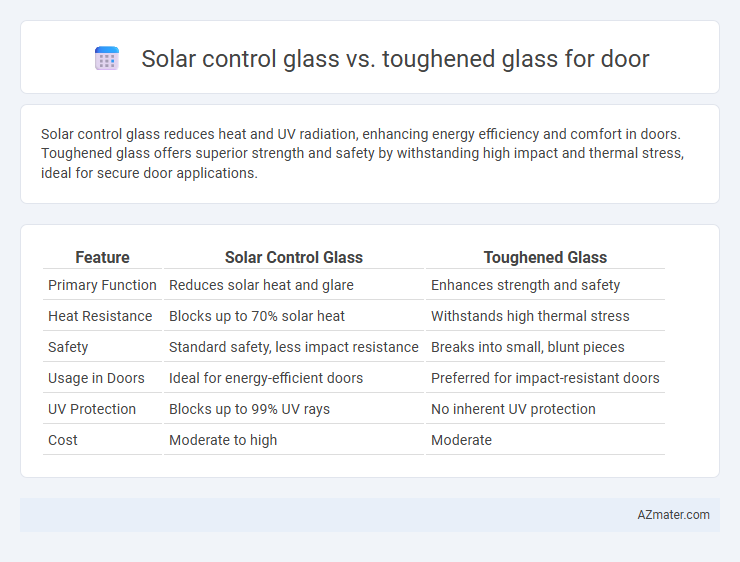Solar control glass reduces heat and UV radiation, enhancing energy efficiency and comfort in doors. Toughened glass offers superior strength and safety by withstanding high impact and thermal stress, ideal for secure door applications.
Table of Comparison
| Feature | Solar Control Glass | Toughened Glass |
|---|---|---|
| Primary Function | Reduces solar heat and glare | Enhances strength and safety |
| Heat Resistance | Blocks up to 70% solar heat | Withstands high thermal stress |
| Safety | Standard safety, less impact resistance | Breaks into small, blunt pieces |
| Usage in Doors | Ideal for energy-efficient doors | Preferred for impact-resistant doors |
| UV Protection | Blocks up to 99% UV rays | No inherent UV protection |
| Cost | Moderate to high | Moderate |
Understanding Solar Control Glass
Solar control glass significantly reduces heat transmission and glare by reflecting and absorbing solar radiation, making it ideal for energy-efficient doors in hot climates. Toughened glass, also known as tempered glass, offers enhanced strength and safety by undergoing a thermal treatment process but lacks specific solar heat rejection properties. Choosing solar control glass for doors optimizes indoor thermal comfort and reduces cooling costs while toughened glass primarily ensures durability and impact resistance.
What Is Toughened Glass?
Toughened glass, also known as tempered glass, is heat-treated to increase its strength and safety, making it ideal for doors that require durability and resistance to impact. Unlike solar control glass, which primarily reduces heat and UV radiation, toughened glass shatters into small, blunt pieces when broken, minimizing injury risk. This makes it a preferred choice for door applications demanding both safety and structural integrity.
Key Differences Between Solar Control and Toughened Glass
Solar control glass for doors primarily reduces heat transmission and glare by reflecting and absorbing solar energy, enhancing energy efficiency and indoor comfort. Toughened glass, also known as tempered glass, is heat-treated to increase strength and safety, shattering into small, blunt pieces rather than sharp shards when broken. The key difference lies in solar control glass's focus on thermal performance and UV protection, whereas toughened glass emphasizes impact resistance and safety durability.
Energy Efficiency Comparison
Solar control glass significantly improves energy efficiency for doors by reducing solar heat gain through its specialized coatings that reflect infrared radiation while allowing natural light transmission. Toughened glass offers enhanced strength and safety but lacks specific thermal insulation properties, making it less effective at minimizing cooling loads and preventing heat transfer. Choosing solar control glass over toughened glass can lead to lower energy consumption and better indoor temperature regulation in door installations.
Safety and Strength Considerations
Solar control glass enhances safety by reducing heat transmission and glare, minimizing thermal stress that can weaken door panels over time. Toughened glass offers superior strength through a rapid cooling process, making it resistant to impact and shattering into small, less harmful pieces upon breakage. For doors, toughened glass provides robust protection against physical forces, while solar control glass optimizes indoor climate safety by controlling solar radiation.
Aesthetic Options and Design Flexibility
Solar control glass offers superior aesthetic options with its ability to filter sunlight and reduce glare through tinted, reflective, or coated finishes, enhancing the door's visual appeal while maintaining energy efficiency. Toughened glass excels in design flexibility by providing high strength and safety, allowing for larger panels and varied shapes without compromising durability. Both types enable customization, but solar control glass is preferred for stylish, light-managing solutions, whereas toughened glass prioritizes structural integrity and versatility in door design.
Performance in Different Climates
Solar control glass excels in reducing heat gain and UV radiation, making it ideal for hot and sunny climates by enhancing energy efficiency and occupant comfort. Toughened glass offers superior strength and safety, performing well in regions prone to impact, wind loads, or temperature fluctuations due to its thermal resistance and shatterproof properties. Choosing between solar control and toughened glass depends on local climate demands, balancing thermal management against durability and safety requirements.
Cost Analysis: Initial and Long-term
Solar control glass typically has a higher initial cost than toughened glass due to advanced coatings that reduce heat transfer and improve energy efficiency. Toughened glass, while more affordable upfront, may incur higher long-term expenses related to increased cooling and heating demands in buildings without solar control properties. Evaluating total cost of ownership involves considering energy savings and potential reductions in HVAC operation when selecting solar control glass for doors.
Installation and Maintenance Requirements
Solar control glass for doors requires careful installation to maintain its reflective coatings, ensuring optimal energy efficiency and heat reduction. Toughened glass demands precise handling during installation due to its brittleness, with strict adherence to safety standards to prevent breakage. Maintenance for solar control glass involves regular cleaning to preserve its solar reflective properties, while toughened glass requires routine inspection for chips or cracks to ensure structural integrity.
Choosing the Right Glass for Your Door
Solar control glass for doors reduces heat and UV radiation, improving energy efficiency and protecting interiors from fading, making it ideal for sunny climates. Toughened glass offers superior strength and safety by withstanding impacts and shattering into small, blunt fragments, suitable for high-traffic or security-focused doors. Selecting the right glass depends on balancing energy performance with safety requirements based on the door's location and usage.

Infographic: Solar control glass vs Toughened glass for Door
 azmater.com
azmater.com